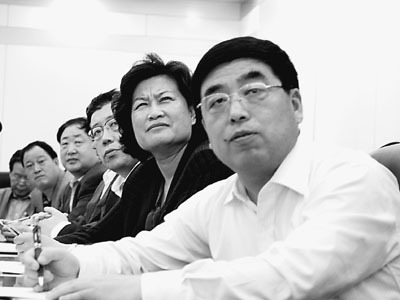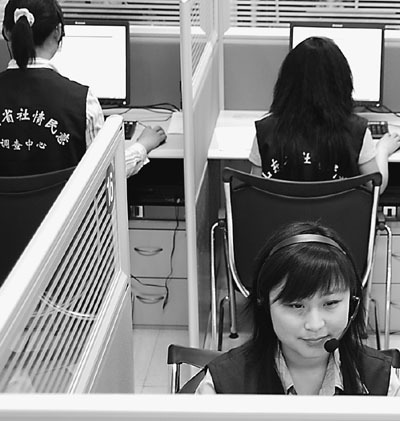
Dezhou and Yantai officials listen to citizens' complaints

Operators conduct the citizen questionnaire
"My pulse quickened when I heard people complaining about the poor quality of our civil services," sadi Yantai Mayor Zhang Jiangting, recalling his attendance at the recent regional inspection. "Medical care, the environment, and the attitude of public servants were the areas people were most unhappy with."
On May 8, the mayors and other leading officials of Dezhou and Yantai traveled to Jinan for their annual regional inspection meeting. This year's meeting for the first time featured a telephone poll of local citizens to gather opinions on the performance of the local government. 1100 randomly selected people were asked 10 questions. Their evaluations will count towards the overall grading of an administration.
At half past six in the evening, nearly 70 operators from the Shandong public-opinion poll center, were busy interviewing the citizens of Dezhou and Yantai
"What do you think about the government's employment aid project?" "Are you satisfied with your neighborhood?" "What do you think of your living conditions and environment?" The ten questions put to every household concerned income, employment, medical care, accommodation, relations between town and country, education, social welfare, social security, government performance and officials' attitudes. Scores ranged from excellent (100), ordinary (75), poor (55) and no opinion (no score).
The officials listening in the auditorium didn't get to see the interviewees' personal information, just a screen display of questions and ratings. Dezhou Mayor Wu Cuiyun, watching the screen attentively, said: "I am really interested to find out what people are dissatisfied with. And I am writing it all down."
Zhang Jiangting, mayor of Yantai, sitting beside Wu, said, "The inspection has given me a chance to listen to the genuine voices of the people; it's something I haven't been able to do before. The government will definitely look into how best to solve these problems."
Shandong's Vice Governor Li Zhaoqian, organization director Li Yumei and discipline committee member Liu Fengqi also attended the hearing.
Head of Shandong's statistical bureau Du Changzuo said that the interviewees were randomly chosen and their private information had been carefully protected to ensure people have the confidence to speak out and tell the truth. With 1100 interviews this was a credible and accurate survey of public opinion, he said.
Shandong Province is piloting a new appraisal system to evaluate local administrations. The provincial Party committee will monitor local governments' performance in terms of economic development, social development, and sustainable development measured against 60 criteria, with a total possible score of 1000. The citizen satisfaction index consists of 3 parts: telephone surveys (accounting for 50 percent of the total amount), official appraisals (25 percent) and delegate (from the Party, people's congress and people's political advisory body) appraisals (25 percent).
The final rating of a local government is determined by multiplying its standard marks by the citizen satisfaction index. For example, a city, with scores of 900 for the first 59 criteria, gets a final rating of 810 after multiplying by its public popularity index of 0.9.
Le Yumei said: "Citizens should supervise government work. Dezhou and Yantai were chosen to pilot the new appraisal program, which will gradually be applied across the province."
(China.org.cn by Dong Chen, May 13, 2008)